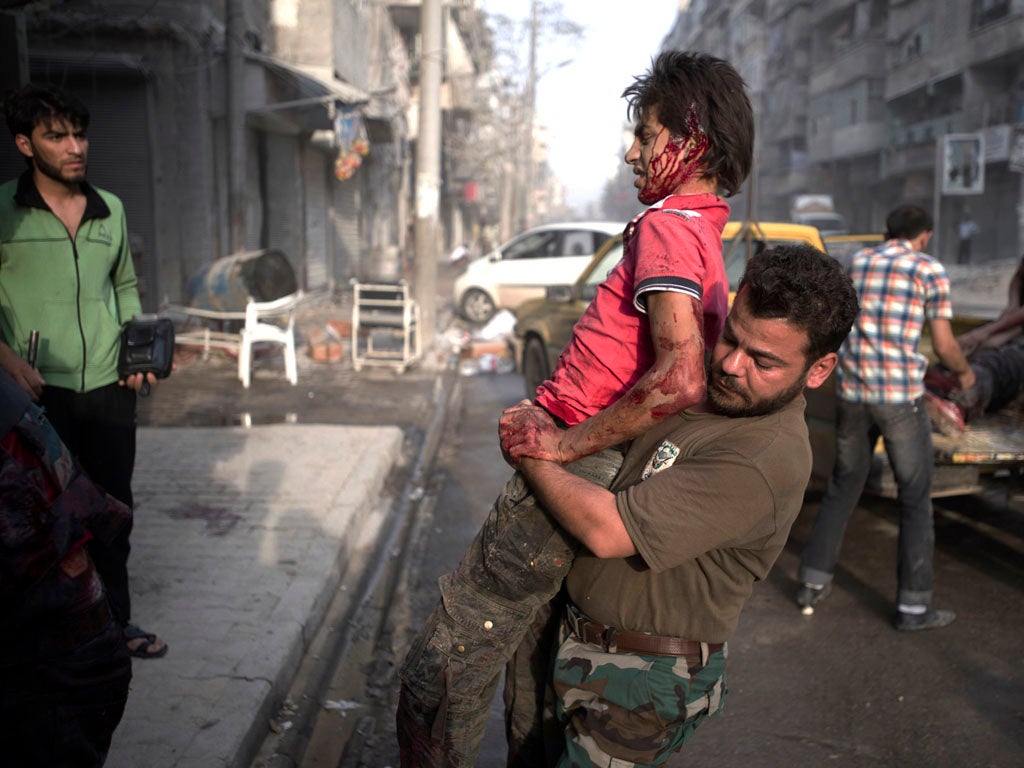How much more bloodshed and brutality must Syria endure before the world fulfils its moral duty?
A traumatised population has suffered long enough. Countries who have influence in Syria should be doing much more to deliver desperately needed humanitarian aid

The last two months have seen a dramatic increase in the crisis in Syria with reports of thousands of people killed, countless injured and over 100,000 people fleeing the country. Last Wednesday saw the bloodiest day to date with 343 reported killed as the UN announced that between 2-3,000 people are leaving Syria each day. Since the onset of the crackdown in March 2011, over 10% of the Syrian population have been forced from their homes. Over a quarter of a million Syrians - including unaccompanied children - have become refugees, crossing to dusty temporary camps in neighbouring Jordan, Turkey, Lebanon and beyond.
The vast majority of Syrians remain displaced inside the country. For these people daily life is characterised by ongoing suffering as they try to flee the violence whilst facing a lack of suitable shelter, dramatic increases in the price of food and shortages of access to basic hygiene. Medical facilities are disintegrating on a daily basis and many civilians caught up by the conflict are dying due to lack of adequate care. Clinics are destroyed or occupied by armed groups, medical supplies denied and treatment for patients with chronic conditions interrupted.
Trauma
Syrians are struggling with the trauma of what they’ve been through and seen: massacres, aerial bombardment and the loss of loved ones. Briefing the United Nations Security Council in September, Lakhdar Brahimi, the UN Arab League joint envoy to the conflict, warned of an upcoming food crisis in the country. Relief agencies regularly highlight that the existing humanitarian response in Syria is insufficient: The valiant Syrian Red Crescent does not have the capacity or the extensive logistics needed to meet the needs of displaced Syrians.
For more than 18 months, as the violence in Syria continues to worsen, the international community remains divided as governments accuse each other of being motivated only by either pro or anti-regime sentiment. This has led to both political gridlock and an increasingly militarized conflict with innocent Syrian civilians the biggest losers. The most important goal is to get the Syrian government to stop its attacks across the country and establish a durable ceasefire, stopping the violence from all sides.
However, if impartial international humanitarian organisations from west and east were allowed access, their skills and expertise could significantly mitigate the impact of violence and alleviate the suffering being endured by hundreds of thousands of Syrians. Such organisations could provide essential medical relief, distribute food, re-establish water supplies and care for vulnerable civilians, guided by the principles of humanity and Geneva Conventions, in a separation from the political agenda. They could also link with and significantly strengthen the work of grassroots local Syrian civil society organisations that have emerged over the past year and a half to play a vital humanitarian role and have unique connections to the local population.
Gridlock
Countries like Indonesia and Brazil have the influence and capacity to act as a bridge between the gridlocked powers and should lead efforts to press the Syrian government to lift restrictions on independent humanitarian organisations that can provide the specialist capacity needed to address the worsening situation. Such a decision would signal that the international community is no longer willing to allow the welfare of hundreds of thousands of displaced and vulnerable people in Syria to be held hostage to ongoing political deadlock. With the harsh Syrian winter approaching a bad humanitarian situation will get very quickly worse unless action is taken.
In early September the new Head of the International Committee of the Red Cross (ICRC), Peter Maurer, met with President Assad. Following their discussions the Syrian government made it known that ''the President confirmed he is in favour of Red Cross action on the ground, as long as it's conducted independently and in a neutral manner''. The Russian and the Chinese governments have also stressed that aid to Syria must be in strict compliance with the humanitarian principles of neutrality and impartiality.
Yet requests by independent, impartial humanitarian organisations for permission to operate in Syria have been blocked, stalled by administrative demands by the Syrian Ministry of Foreign Affairs. Organisations present in Syria are hampered by the Syrian authorities travel restrictions, preventing their deployment to parts of Syria where they are most needed.
September’s UN General Assembly meeting saw a variety of world leaders condemn the situation in Syria, yet the situation on the ground has continued to worsen. Now is the time to show the people of Syria that the international community is not simply a bystander to their tragedy. Countries with influence in Syria should see achieving unimpeded, safe and sustained humanitarian access to Syria not as a political choice, but rather a moral responsibility.
Dr. Hany El-Banna is the President of Humanitarian Forum and a Co-Founder of Islamic Relief

Join our commenting forum
Join thought-provoking conversations, follow other Independent readers and see their replies